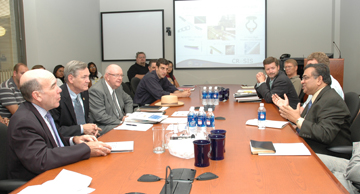Congressman Takes Note of KU’s NSF Polar Ice Center

The NSF Center for Remote Sensing of Ice Sheets played host to U.S. Rep. Dennis Moore (D- Kan.) on Aug. 28 at the University of Kansas.
Moore learned of the groundbreaking work taking place at CReSIS -- a multidisciplinary, multi-institutional NSF science and technology center headquartered at KU. Engineers and researchers at the center are developing new tools, technology and computer models to better understand what is happening to the earth’s polar ice sheets and their role in sea level rise. The effort centers on remote sensing technology and integrates expertise in electrical engineering, information technology, aerospace engineering, glaciology and geophysics.
Distinguished Professor Prasad Gogineni led the presentation for Moore, which highlighted the first-of-its-kind work and research being undertaken by the center’s faculty, students and staff. As was reported in Science in February 2006, data collected through the center’s specially designed radars show that some of Greenland’s glaciers are flowing into the ocean at twice the rate previously believed, Gogineni said.
Dozens of graduate and undergraduate students who work at the center were present to talk about their roles in the research efforts.
Associate Professor of Aerospace Engineering Richard Hale, who is leading the center’s UAV research and design efforts, talked about the special challenges and opportunities of designing aircraft that can carry the radar payload and operate in the extreme arctic conditions. The Aerospace Engineering Department is actively incorporating projects from CReSIS into the classroom, Hale said. Presently 15 aerospace engineering courses at KU incorporate CReSIS projects and efforts into the curriculum.
After the presentation, Moore was led on a tour through CReSIS facilities and given an opportunity to talk to some of the students and researchers working on the delicate radars the center has developed.
Other institutions integral to the center -- core partners – are: Elizabeth City (N.C.) State University, Haskell Indian Nations University, the University of Maine, The Ohio State University and Pennsylvania State University.
International partner institutions are: University College of London, University of Copenhagen, Denmark Technical University and University of Tasmania.